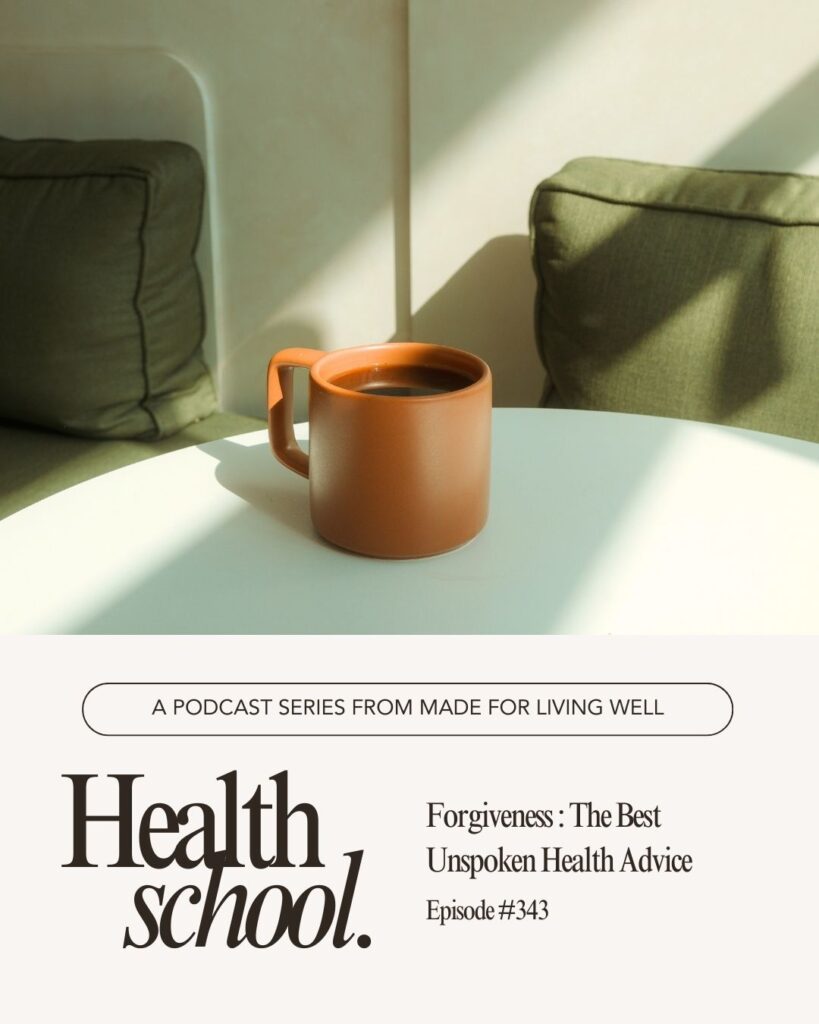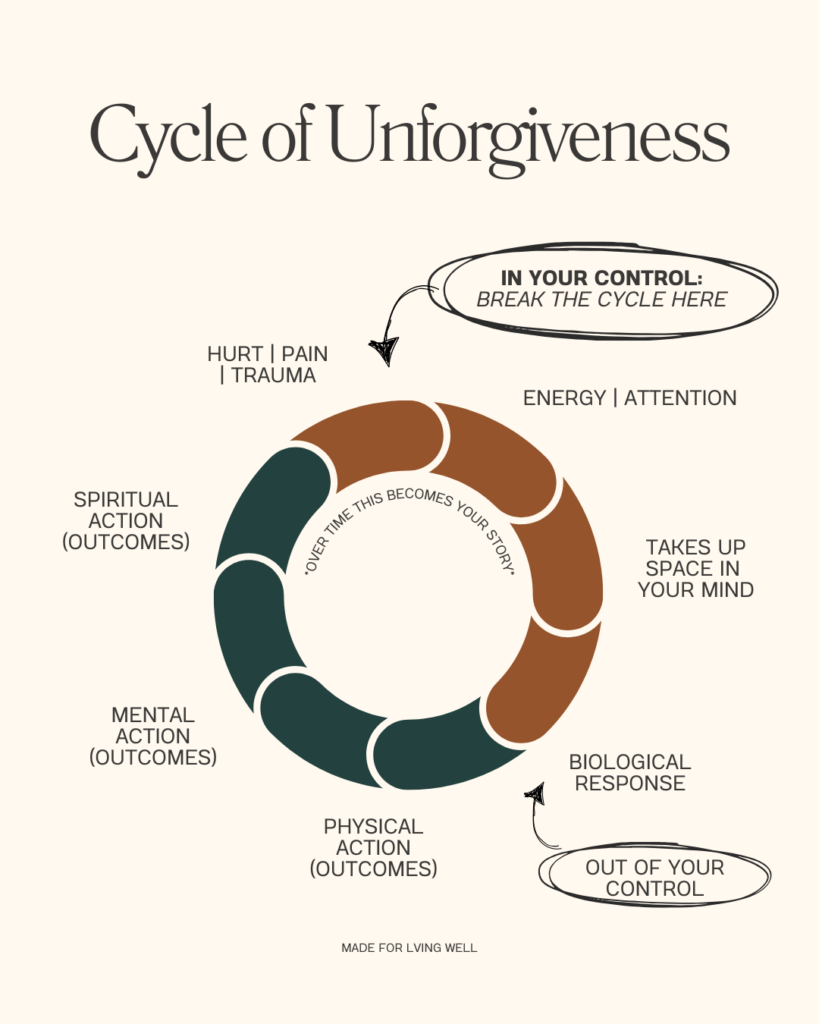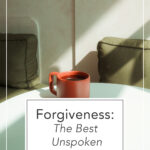
Listen on iTunes | Listen on Spotify | Listen on YouTube | Review the Podcast
Forgiveness is not the sexiest tool in the health space. In fact, most wouldn’t consider it a health tool, even though it has a massive health impact – arguably just as much (if not more) than what you eat.
Research has found that forgiveness changes your mind and biology. It improves heart health, immune function, hormonal flow, and reproductive health, to name a few.
Unfortunately, most people aren’t great at forgiveness, especially forgiving themself.
Honestly, I wasn’t any better. My stubbornness is partially to blame, but I also misunderstood what forgiveness meant, keeping me stuck holding on to my pain and anger. It kept me holding onto the hurt that ended in bitterness. Thankfully, I didn’t stay here.
After years of studying and living in a posture of forgiveness, I have new thoughts and research on why it’s one of the most remarkable healing tools we have at our disposal. Not to mention, it’s free!
In the podcast, I present a new view of forgiveness, using it to gain health. It helps you heal from bad diet advice, but more importantly, it helps you forgive, which is the epitome of good diet advice. If you want to be well, you have to forgive. Listen to the podcast to learn more.
The biological power of forgiveness.
Author and researcher Robin Casarjian says in her book Forgiveness: A Bold Choice for a Peaceful Heart, “Your concept of forgiveness can either hinder you and limit your capacity for clarity and joy, or it can uplift you, giving you a way to release the past and be free to live with greater peace and happiness.”
Forgiveness or a lack of it can change the physical structure of your DNA and cells. It’s wildly powerful in the outcomes you experience. The reason is based on how forgiveness or unforgiveness communicates with your body—how it acts on your energy level and survival response.
Ultimately, forgiveness or unforgiveness changes your perspective, changing the course of your entire biology.
Health problems associated with unforgiveness.
Unforgiveness is an energy-exhaustive activity. Everything you hold on to takes work and energy, which over time gets recycled, stealing precious energy from your life. Holding onto what you choose not to release through forgiveness steals energy from other life-giving processes. It downregulates your entire biology, creating patterns of unhealth and disease.

It’s the energy-wasting cycle of unforgiveness that acts on your cellular DNA, creating patterns of survival.
The good news is it doesn’t have to stay that way. You can break the cycle and pattern through forgiveness.
The Healing Power of Forgiveness: How Letting Go Transforms Your Health
The definition of forgiveness is letting go of negative feelings associated with anger, guilt, shame, resentment, and bitterness to create (or restore) wholeness.
I love the definition because it lays out its direct link to health.
Let me clarify. The root word for health comes from the old English word ‘hale’, which means “wholeness.”
It doesn’t implicitly state that forgiveness is a process of health, but when you combine the two, you can see how they go hand in hand. You might even push that to see how they are the same—forgiveness is health, and health is forgiveness.
Trust me, I know that might sound off the wall. I wanted to argue it (and did) for much of my life. I hated the idea of forgiveness, but they’re more alike than different.
True health requires a level of forgiveness.
You need to shift your view of forgiveness and understand what it’s not so you can embrace and live what it is.
To be clear, forgiveness is not:
- A feeling.
- Denying the hurt.
- Not the same as reconciliation.
- It does not circumvent god’s justice.
- Excuse wrong behavior.
- Let the guilty (or guilty party) off the hook.
- Explaining away the hurt.
- A means of stuffing your emotions.
Rather, forgiveness is a release. It’s dying to the old hurt, pain, trauma, and stories so you can create space for the new. Forgiveness is a cycle-breaking activity.
5 Steps to Forgiveness
First, I must clarify that forgiveness doesn’t stop you from getting hurt. It’s a means of dealing with the hurt, which is a form of protection from it. When you know how to deal with hurt instead of stewing on it, you don’t have to experience the pain for as long. And maybe, just maybe, that makes it less painful.
STEP ONE: You must choose it.
The natural pull is never toward forgiveness. It’s generally towards holding onto and storing. That means You must decide you will forgive (and this is often a daily, even hourly, choice).
STEP TWO: Be radically honest about what you feel.
It might be the hardest step — the one you want to avoid in an attempt not to feel. But you must understand what you feel (even accept that you’ve been hurt) to release it. That doesn’t mean precision. It means acknowledging what you don’t like and want to release.
STEP THREE: Have compassion for yourself and others.
Compassion doesn’t mean you excuse or justify it; it simply means you see the hurt as an effect of a poor story, whether yours or someone else. Hurt people, hurt people. That doesn’t make it right, but it helps you see that the pain didn’t always come from a place of truth but often a place of pain. Understanding this makes it easier to release it.
**Your body doesn’t like to hold and store what it thinks is untrue. Stop making everything true when few things are.
STEP FOUR: Let go.
Literally, take a breath and choose to release it. This is the decision choosing to move forward beyond what hurt you. It’s a commitment to let go and move into something new. I promise it’s really this simple (although not easy).
STEP FIVE: Take responsibility.
You are responsible for the story you tell yourself. Take responsibility for that, choosing to live differently. Do something to help write a better ending to your existing story.
Remember, the person you may need to forgive the most is yourself. Don’t discount how you hurt yourself and the way you’ve blamed your body for things it wasn’t responsible for.
It’s not easy, but forgiveness is powerful. Stop discounting the work of forgiveness. It has the power to radically alter your health, releasing the weight you carry that can be seen in physical pounds.
If you want to learn more, check out these resources:
Check out the previous anti-dieting podcasts in the mini-series that highlight reducing stress. Part one dives into the biological need for dieting, and part two is on the generational curse of health.
Books referenced inside the podcast and article:
Additional articles you’ll find interesting:
- (Holy) Confidence Changes Your Biology
- The very topic that inspired this space: Four Lessons from The Woman At The Well
- How You Heal: The Radical Truth About Forgiveness
- 15 Habits To Take Into The New Year
